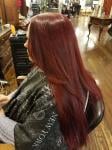The Cancer Survivors Network (CSN) is a peer support community for cancer patients, survivors, caregivers, families, and friends! CSN is a safe place to connect with others who share your interests and experiences.
Chemo, what to eat and what not to eat?

Comments
-
My hospital has an onocology
My hospital has an onocology nutritionist. You should check with them. I am a vegan, and knock on wood, have kept my appetite. I can't eat roasted cauliflower which i used to love, or curry. Sometimes hot sauce gets to me, but mostly I eat a lot of spice still. I drink a lot of water.
-
I just let my stomache choose
I had 48 weekly sessions of 5Fu ( via drip in the back of alternate hands each week) It was enhanced with a drug called levamisole which has since been banned. Nothing tasted as it should have so I quickly realised I had to eat bland food. I survived for a year on rolled oats made on milk with a dollop of honey. Remarkably my blood counts stayed nornal for all of chemo and I never lost any weight. I often wonderred if I was doing the right thing. My oncologist was happy with my results and just said whatever you are doing just keep on doing it because it is working for you. The only other intake I had regularly wa fresh fruit and fresh fish . (fished a lot whilst on chemo.) my cancer was stage 3c colon into 6 nodes . It was very aggressive and my surgeon said three years max , too aggressive ,too many nodes. Last January I reached 20 yeras still cancer free, Kind Regards Ron.
-
-
Diet
From my understanding, a pesco-vegetarian diet is the healthiest. But keeping your weight up duing chemo will be a priority. So I would go along with the "eat what you want" people. Also, you might want to consider a Cimetadine supplement (https://csn.cancer.org/node/315844). Good luck with your journey.
-
-
Thank you guys, I really
Thank you guys, I really appreciate your input and suggestions. Just talked with a neighbor I never realized had the same cancer. She said that she went with the "Eat what you want" approach that worked for her but everyone is different. Definately drink alot of water.
-
evidence based suggestions on diet
***Please think long and hard before going with the "eat what you want" approach. Food can be medicine, or poison. Follow the evidence
Video links below to a presentation by a Stanford trained oncologist and two researcher who have developed overlapping non-toxic therapies that appear promissing.
There have been limited clinical testing and a few small trials which indicate that low carbohydrate diets, restricted ketogetic diets in some cases, and short term fasting can lower side effects of chemo and radiation and may have a growth stunting effect on the cancer.
Oncologist - Dr. Lemanne provides a good overveiw and some of the findings:
https://www.youtube.com/watch?v=W_diITmOeCM
Professor Seyfried has been studying the metabolism of cancer for years. His refined technique, Press-Pulse, is explained starting at about 13 minutes:
https://www.youtube.com/watch?v=3TZnjC7SR_w
Professor Longo is doing important work applying limited fasting regimes to cancer treatments. Here, he explains some of the background research:
https://www.youtube.com/watch?v=v4ame4E1rtE
To summarize -
Carbohydrate restriction (no simple carbs and sugary foods) is the base. This limits glucose, especially glcuose spikes, which drive up insulin, that in turn stimulate growth pathways, (mTOR, ect) Also, moderate to low protein.
More agressive diets use much lower carbohydrates and supplement calories with quality fats.
Limited fasting for 2 or 3 days leading into treatment (chemo or radiation) may lower side effects, and allow for lower doses, making the chemo and radiation more effective (Ref. V. Longo). Fasting can be done with small amounts of food totaling around 700 calories per day (of which 50% is fat). This appears to work very well with radiation treatments.
Exercise is not mentioned, but studies show that patients who exercise do better.
Avoid high protein. Avoid excess calories.
Adding hyperbaric oxygen treatment along with a glutamine inhibitor may further kill off cancer (Ref. T. Seyfried).
These options are non-toxic, which is a big advantage. Based on animal studies, limited human studies and clinical experience, they can be done with reasonable hope that they will slow cancer growth and make you feel better.
There was also a recent study whoch showed that Stage III CC patients whi consumed walnuts (at least 2 ounces a week) did markedly better in terms of recurrence.
Reseach out of the Reynolds Lab U of F, suppports the consumptionof of Curcumin (tumeric), sulphorafane (Brocolli Sprouts), and EGCG (green tea)
If you do nothing else cut out all simple carbs and do modest fasting for 48 to 72 hours prior to each chemo treatment.
If you're up to the research you can find Prof Longo's work in PubMed (or Google Scholar) . Same with Prof Seyfried.
-
QuestionsSonicSedition said:Thank you guys, I really
Thank you guys, I really appreciate your input and suggestions. Just talked with a neighbor I never realized had the same cancer. She said that she went with the "Eat what you want" approach that worked for her but everyone is different. Definately drink alot of water.
Glad you feel better about the answer and if you have more questions, please ask away we are always here to help.
Kim
-
Dear Friend,
I would agree with the low carbs diet and Plenty of liquids especially if you had diarrhea.
The biggest challenge is to find food that gets rid of the terrible taste in the mouth. I found fish (salmon), rise and pickled ginger the best for that.
Chemo will make your moouth, teeth, throat and skin super sensitive to cold things. So have everything on the warm side.
If you will have surgery start taking 800mg Cimetidine a day (over the counter) at least 2 weeks before and after the surgery.
My eyes were burning badly and used Visine. Chemo dries out your skin so plenty of moisturizer.
All the best,
Laz
-
Eat what you can tolerate.
I was initially told I didn't have to change my diet. Even after surgery they had me on no food restrictions. Well, the day of surgery I woke up and asked my wife to bring a big mac. Something I normally don't eat but figured WTH. It didn't stay down. It came back up in 15 minutes. Their idea of no restrictions is within a range of reason. What that is, I don't know but mcd's was off the menu going forward.
-
Cravings
It's really wierd but you might get cravings for food that you haven't had for years, maybe even since you were little come back to you. Mine were Windmill cookies - really strange and it took me 6 weeks to find them. Now everywhere I'm at there they are LOL. Eat your cravings as it seems your body is telling you something - maybe comfort, maybe memories, maybe something you denied yourself before but it did help when not being able to eat all the time.
Kim
-
More like lack-of-evidencepeterz54 said:evidence based suggestions on diet
***Please think long and hard before going with the "eat what you want" approach. Food can be medicine, or poison. Follow the evidence
Video links below to a presentation by a Stanford trained oncologist and two researcher who have developed overlapping non-toxic therapies that appear promissing.
There have been limited clinical testing and a few small trials which indicate that low carbohydrate diets, restricted ketogetic diets in some cases, and short term fasting can lower side effects of chemo and radiation and may have a growth stunting effect on the cancer.
Oncologist - Dr. Lemanne provides a good overveiw and some of the findings:
https://www.youtube.com/watch?v=W_diITmOeCM
Professor Seyfried has been studying the metabolism of cancer for years. His refined technique, Press-Pulse, is explained starting at about 13 minutes:
https://www.youtube.com/watch?v=3TZnjC7SR_w
Professor Longo is doing important work applying limited fasting regimes to cancer treatments. Here, he explains some of the background research:
https://www.youtube.com/watch?v=v4ame4E1rtE
To summarize -
Carbohydrate restriction (no simple carbs and sugary foods) is the base. This limits glucose, especially glcuose spikes, which drive up insulin, that in turn stimulate growth pathways, (mTOR, ect) Also, moderate to low protein.
More agressive diets use much lower carbohydrates and supplement calories with quality fats.
Limited fasting for 2 or 3 days leading into treatment (chemo or radiation) may lower side effects, and allow for lower doses, making the chemo and radiation more effective (Ref. V. Longo). Fasting can be done with small amounts of food totaling around 700 calories per day (of which 50% is fat). This appears to work very well with radiation treatments.
Exercise is not mentioned, but studies show that patients who exercise do better.
Avoid high protein. Avoid excess calories.
Adding hyperbaric oxygen treatment along with a glutamine inhibitor may further kill off cancer (Ref. T. Seyfried).
These options are non-toxic, which is a big advantage. Based on animal studies, limited human studies and clinical experience, they can be done with reasonable hope that they will slow cancer growth and make you feel better.
There was also a recent study whoch showed that Stage III CC patients whi consumed walnuts (at least 2 ounces a week) did markedly better in terms of recurrence.
Reseach out of the Reynolds Lab U of F, suppports the consumptionof of Curcumin (tumeric), sulphorafane (Brocolli Sprouts), and EGCG (green tea)
If you do nothing else cut out all simple carbs and do modest fasting for 48 to 72 hours prior to each chemo treatment.
If you're up to the research you can find Prof Longo's work in PubMed (or Google Scholar) . Same with Prof Seyfried.
>>>Video links below to a presentation by a Stanford trained oncologist and two researcher who have developed overlapping non-toxic therapies that appear promissing.
These diets may appear promising, since they make really exaggerated claims, but they are based on very little evidence. Seyfried has only 2 human cases published - so it's anecdotal.
https://sciencebasedmedicine.org/ketogenic-diets-for-cancer-hype-versus-science/
--
When you start looking for real evidence the ketogenic diet doesn't work well wrt cancer.
https://www.ncbi.nlm.nih.gov/pubmed/29322234
-
Depends on your situation
Check with your doc. I'm inoperable stage 4 with an ileostomy so my ability to eat vegetables is limited and my doc basically said getting calories in me is more important than where they come from so I just eat whatever I want. Most of it tastes like crap and I have problems eatng due to mouth ulcers, but that's a different problem.
-
Water without ice. The coldSonicSedition said:Thank you guys, I really
Thank you guys, I really appreciate your input and suggestions. Just talked with a neighbor I never realized had the same cancer. She said that she went with the "Eat what you want" approach that worked for her but everyone is different. Definately drink alot of water.
Water without ice. The cold sensitivity seems to be fairly universal during chemo............Dave
Discussion Boards
- All Discussion Boards
- 6 Cancer Survivors Network Information
- 6 Welcome to CSN
- 122.6K Cancer specific
- 2.8K Anal Cancer
- 457 Bladder Cancer
- 312 Bone Cancers
- 1.7K Brain Cancer
- 28.6K Breast Cancer
- 407 Childhood Cancers
- 28K Colorectal Cancer
- 4.6K Esophageal Cancer
- 1.2K Gynecological Cancers (other than ovarian and uterine)
- 13.1K Head and Neck Cancer
- 6.4K Kidney Cancer
- 684 Leukemia
- 804 Liver Cancer
- 4.2K Lung Cancer
- 5.1K Lymphoma (Hodgkin and Non-Hodgkin)
- 242 Multiple Myeloma
- 7.2K Ovarian Cancer
- 70 Pancreatic Cancer
- 493 Peritoneal Cancer
- 5.7K Prostate Cancer
- 1.2K Rare and Other Cancers
- 544 Sarcoma
- 744 Skin Cancer
- 661 Stomach Cancer
- 193 Testicular Cancer
- 1.5K Thyroid Cancer
- 5.9K Uterine/Endometrial Cancer
- 6.4K Lifestyle Discussion Boards








